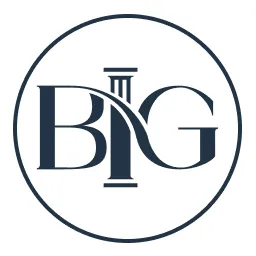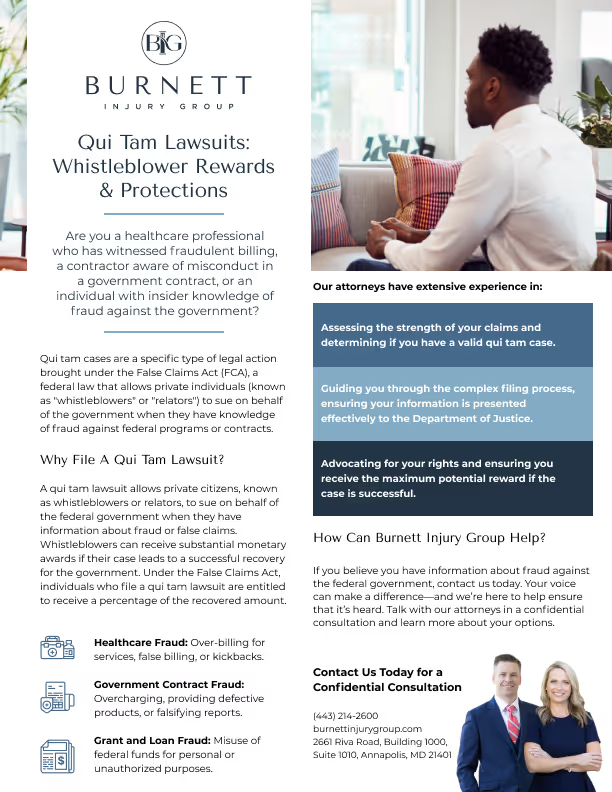What is a Qui Tam Lawsuit?
A qui tam lawsuit allows private citizens, known as whistleblowers or relators, to sue on behalf of the federal government when they have information about fraud or false claims. These cases often involve complex schemes where companies or individuals have improperly billed the government or received payments they weren’t entitled to. Examples include:
- Healthcare Fraud: Overbilling for services, false billing, or kickbacks.
- Government Contract Fraud: Overcharging, providing defective products, or falsifying reports.
- Grant and Loan Fraud: Misuse of federal funds for personal or unauthorized purposes.
Why File a Qui Tam Case?
When you file a qui tam lawsuit, you’re not only helping to protect taxpayer dollars, but you may also be eligible to receive a portion of any funds recovered as a reward—typically between 15% and 30% of the total recovery. The law also provides protections against retaliation, ensuring that your job and livelihood are safeguarded.

Our Approach
We understand that deciding to come forward as a whistleblower is not an easy choice. Our experienced attorneys are here to provide confidential advice and guidance every step of the way. We’ll work to ensure that your rights are protected, your contributions are recognized, and that you have the support needed to hold wrongdoers accountable.
Why Choose Burnett Injury Group?
- Experience and Knowledge: Our legal team has a deep understanding of the False Claims Act and how to navigate the complexities of qui tam cases.
- Personalized Representation: We handle each case with the utmost care and attention, developing a strategy tailored to your unique circumstances.
- Commitment to Justice: We are dedicated to exposing fraud and securing the best possible outcomes for our clients and the government.
Who Are Whistleblowers?
Whistleblowers in qui tam cases are often insiders—employees, contractors, or individuals closely connected to the company or organization committing fraud. They have firsthand knowledge of the wrongdoing and choose to come forward to expose fraud that is costing the government—and taxpayers—millions, if not billions, of dollars.
Common Whistleblower Profiles Include:
- Healthcare Professionals such as doctors, nurses, or billing staff who witness fraudulent billing practices in hospitals, clinics, or nursing homes.
- Pharmaceutical Employees who uncover illegal marketing schemes, kickbacks, or falsification of drug trials.
- Defense Contractors and engineers who see overcharging or substitution of substandard products on government contracts.
- Government Employees who notice misuse of federal funds or violations of compliance requirements.
These individuals risk their careers and reputations to do what is right. The law recognizes their bravery by providing financial incentives and legal protections against retaliation, such as demotion, firing, or harassment.
What is the Most Common Type of Qui Tam Claim?
The majority of qui tam cases arise from healthcare fraud, which has consistently been the leading type of fraud reported under the False Claims Act. Some of the most common healthcare fraud schemes include:
- Billing for Services Not Provided:
- Submitting claims for medical services, equipment, or tests that were never performed or provided.
- Upcoding or Overbilling:
- Billing for a higher level of service than what was actually provided, resulting in higher reimbursement rates.
- Kickbacks and Referrals:
- Offering or accepting payments in exchange for patient referrals, which is illegal under the Anti-Kickback Statute and the Stark Law.
- Medicare and Medicaid Fraud:
- Inflating costs, misrepresenting patient diagnoses, or falsifying treatment records to receive higher reimbursements.
- Drug Pricing and Off-Label Marketing:
- Falsifying drug pricing to Medicare/Medicaid, or promoting drugs for uses not approved by the FDA.
Aside from healthcare, other common areas of fraud include:
- Defense Contractor Fraud:
- Overcharging the Department of Defense or delivering substandard goods or services.
- Grant and Research Fraud:
- Misuse of federal funds in educational institutions or research facilities by falsifying data or using funds for unauthorized purposes.
- COVID-19 Relief Fraud:
- Abuse of relief programs like the Paycheck Protection Program (PPP) or Economic Injury Disaster Loans (EIDL) by claiming ineligible benefits or misrepresenting business losses.
How Can Burnett Injury Group Help?
Whether you are a healthcare professional who has witnessed fraudulent billing, a contractor aware of misconduct in a government contract, or any individual with insider knowledge of fraud against the government, the team at Burnett Injury Group is here to support you.
Our attorneys have the expertise to:
- Assess the strength of your claims and determine if you have a valid qui tam case.
- Guide you through the complex filing process, ensuring your information is presented effectively to the Department of Justice.
- Advocate for your rights and ensure you receive the maximum potential reward if the case is successful.

Benefits of Being a Whistleblower
Choosing to become a whistleblower can be a difficult decision, but there are significant benefits to taking a stand against fraud and misconduct. The False Claims Act (FCA) and other whistleblower protection laws provide rewards and safeguards for individuals who expose wrongdoing. Here’s what you should know about the potential benefits of being a whistleblower:
1. Financial Rewards
Whistleblowers can receive substantial monetary awards if their case leads to a successful recovery for the government. Under the False Claims Act, individuals who file a qui tam lawsuit are entitled to receive a percentage of the recovered amount, which can range from 15% to 30% of the total settlement or judgment. Given that recoveries in fraud cases often reach millions—or even billions—of dollars, whistleblowers can receive significant compensation for their courage and efforts.
The exact amount depends on factors such as:
- Whether the Government Intervenes: If the government takes over the case, whistleblowers typically receive 15% to 25% of the recovery. If they pursue the case without government intervention, they can receive up to 30%.
- The Quality of the Whistleblower’s Contribution: Whistleblowers who provide high-quality information and cooperate with the investigation are often rewarded at the higher end of the spectrum.
2. Legal Protections Against Retaliation
Many whistleblowers worry about potential retaliation from their employer, such as termination, demotion, harassment, or other forms of discrimination. The False Claims Act and other whistleblower laws include strong anti-retaliation provisions that protect whistleblowers from adverse employment actions.
Protections include:
- Reinstatement if the whistleblower was fired or demoted.
- Double Back Pay for lost wages.
- Compensation for Special Damages, including emotional distress and attorney’s fees.
If you experience retaliation for blowing the whistle, you have the right to file a separate lawsuit against your employer to recover these damages.
3. The Opportunity to Make a Difference
By coming forward with information about fraud, whistleblowers play a crucial role in holding wrongdoers accountable and safeguarding taxpayer dollars. Many whistleblowers feel a sense of pride and accomplishment knowing that their actions helped stop illegal activities, protect public funds, and prevent harm to others.
4. Confidentiality and Anonymity
In many cases, whistleblowers can remain anonymous during the initial stages of the investigation, as the lawsuit is filed under seal. This means the defendant is not immediately aware of the lawsuit, allowing the government to investigate thoroughly without interference.
Additionally, whistleblowers in certain programs, such as the Securities and Exchange Commission (SEC) or Commodity Futures Trading Commission (CFTC) whistleblower programs, can file claims anonymously through an attorney, further protecting their identity.
5. Potential for a Career Shift
Some whistleblowers, after exposing fraud, find new career opportunities in compliance, ethics, and legal fields. Their experience and knowledge gained from participating in complex investigations make them valuable assets to organizations focused on compliance and corporate integrity.
6. Empowerment and Personal Fulfillment
Standing up against wrongdoing can be an empowering experience. Whistleblowers often express a strong sense of personal fulfillment from knowing they made a positive impact on society and contributed to the enforcement of ethical standards.
Considering Becoming a Whistleblower?
If you have knowledge of fraud against the government and are considering coming forward, the Burnett Injury Group is here to help you understand your rights and the potential benefits. Contact us for a confidential consultation to discuss your case and how we can help you navigate the process securely and effectively.












